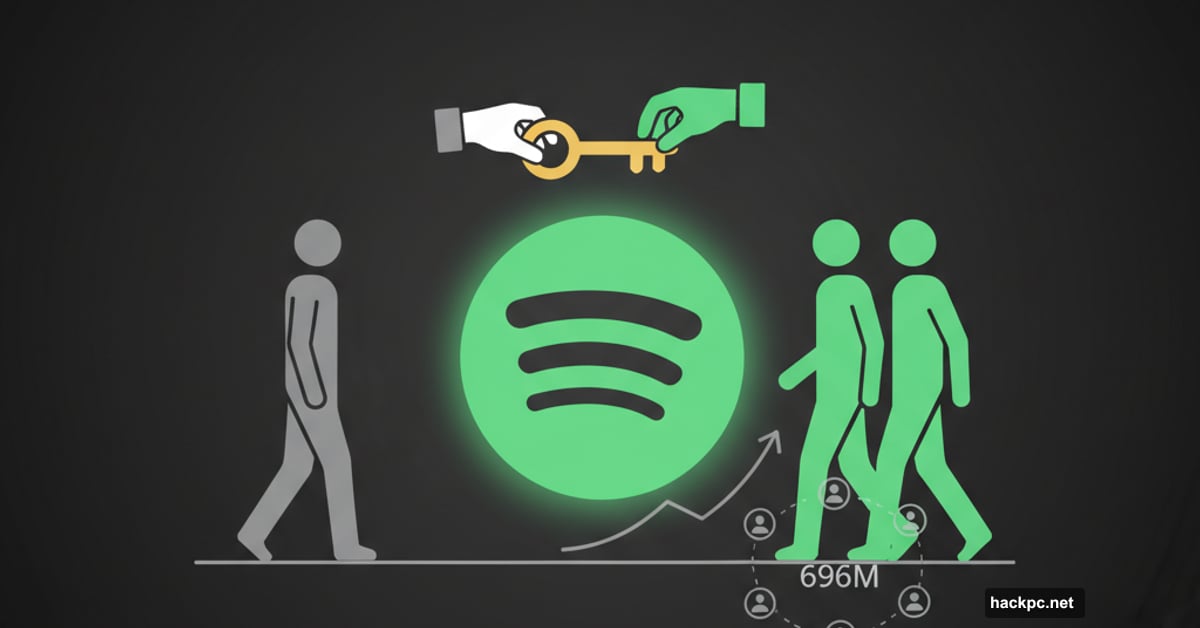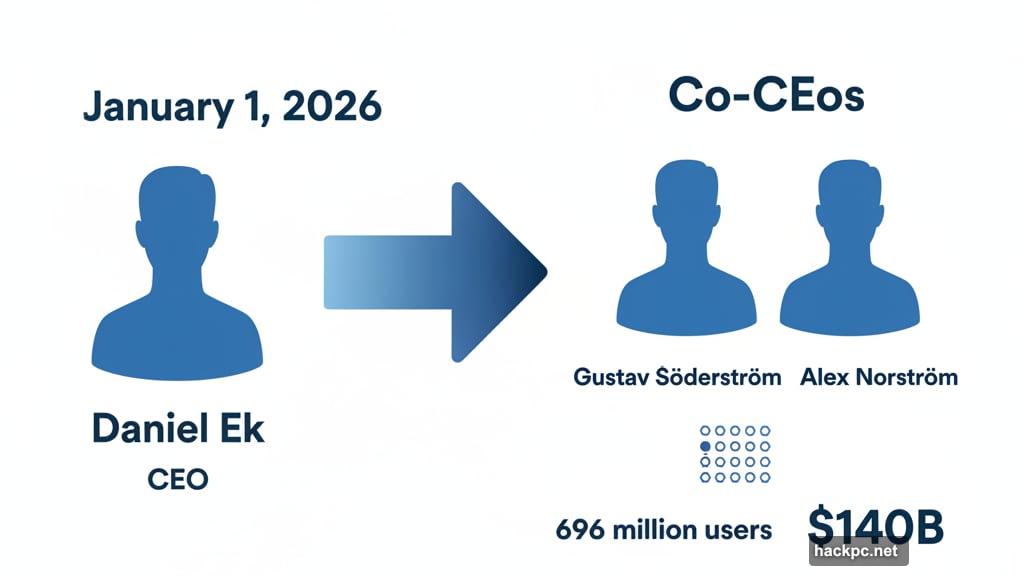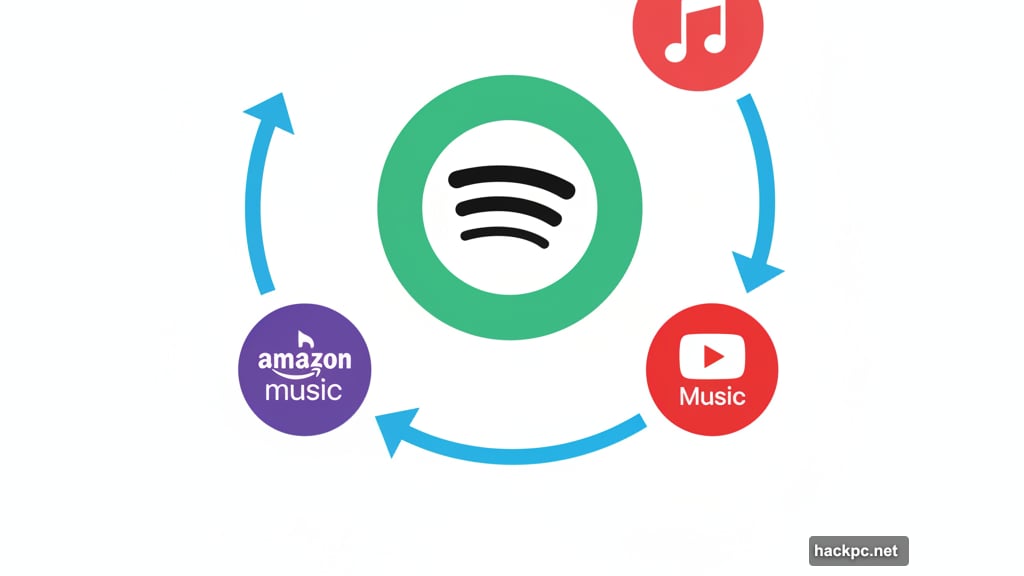
Daniel Ek built Spotify from scratch. Now he’s handing the keys to two longtime executives who shaped the company from day one.
The transition happens January 1, 2026. Gustav Söderström and Alex Norström will become co-CEOs, sharing responsibility for the streaming giant’s 696 million users and $140 billion market cap. Meanwhile, Ek moves to executive chairman, focusing on long-term strategy instead of daily operations.
Investors didn’t love the news. Spotify shares dropped 6% immediately after the announcement.
Why Ek’s Stepping Back Now
Ek co-founded Spotify in 2006 and launched it publicly in 2008. For nearly two decades, he steered the company through brutal competition with Apple Music, YouTube Music, and Amazon Music. He also navigated artist payment controversies, podcast expansion, and repeated price hikes.
So why leave now? According to Ek, he’s not really leaving. He’s been gradually handing control to Söderström and Norström for years. The new titles just match how Spotify already operates behind the scenes.
“Over the last few years, I’ve turned over a large part of the day-to-day management and strategic direction of Spotify to Alex and Gustav,” Ek said in a company release. Both executives have worked at Spotify since its earliest days.
Still, the timing raises questions. Spotify just reported mixed second-quarter earnings. Revenue hit 4.19 billion euros but missed analyst estimates. Plus, advertising revenue dropped 1% year-over-year, raising concerns about that business segment.
The New Leadership Team
Söderström and Norström aren’t unknown quantities. Both have been co-presidents and deeply involved in major strategic decisions.
Söderström oversees product development and user experience. He’s responsible for features like Spotify’s algorithm-driven playlists and the controversial shift toward podcasts. Under his leadership, Spotify expanded beyond music into audiobooks and exclusive podcast content.
Norström handles business operations and partnerships. He managed Spotify’s global expansion and negotiated deals with record labels. Those negotiations determined how much artists get paid per stream, a constant source of tension in the music industry.
Together, they’ll face immediate challenges. Spotify recently raised prices again in September 2025. Premium subscriptions now cost $14.08 monthly in most markets, up from $12.90. That’s the company’s second major price increase in two years.

Higher prices boost revenue per user. But they also risk pushing subscribers toward cheaper competitors. Spotify expects to add 14 million active users and five million premium subscribers this quarter. Whether those projections hold depends partly on how customers react to price hikes.
The AI Problem Nobody’s Talking About
Spotify faces a brewing crisis with AI-generated music. Last week, the company revealed it deleted 75 million AI spam tracks in the past 12 months. That’s an astonishing number that suggests the problem’s getting worse, not better.
What’s happening? Bad actors upload AI-generated songs en masse. They game Spotify’s algorithm to collect streaming royalties. This dilutes payments to real artists while flooding the platform with low-quality content.
Spotify rolled out updated policies to combat AI abuse. But enforcement remains tricky. How do you tell the difference between legitimate AI-assisted music and pure spam? Plus, removing tracks risks false positives that anger legitimate artists experimenting with AI tools.
The co-CEOs inherit this mess. Their decisions about AI policy will shape whether Spotify becomes a haven for authentic music or gets overrun by algorithmic garbage.
What Ek Does Next
As executive chairman, Ek will focus on long-term strategy and supporting senior leadership. That’s corporate-speak for staying involved without handling daily crises.
He’s now worth $9.8 billion according to Forbes. So financial pressure isn’t driving this change. Instead, it seems Ek wants to step back from operational grind while maintaining influence over Spotify’s direction.
This mirrors moves by other tech founders. Jeff Bezos stepped down as Amazon CEO to focus on other ventures. Larry Page and Sergey Brin distanced themselves from Google’s daily operations. Bill Gates left Microsoft’s CEO role to work on his foundation.
In each case, founders retained significant power through board positions and stock ownership. Ek will likely follow this pattern, shaping major decisions while letting co-CEOs handle execution.
The Market’s Skeptical
That 6% stock drop tells you what investors think. They’re worried about leadership transition at a challenging moment.
Spotify stock climbed 54% year-to-date before this announcement. That’s impressive growth driven by subscriber additions and price increases. But maintaining that momentum requires flawless execution.

Wall Street likes predictability. A sudden CEO change introduces uncertainty, even when longtime executives take over. Investors question whether Söderström and Norström can maintain growth without Ek’s vision and industry relationships.
Plus, Spotify operates in a brutally competitive market. Apple Music leverages iPhone integration. YouTube Music taps Google’s massive reach. Amazon Music bundles with Prime subscriptions. Every competitor has advantages Spotify lacks.
Söderström and Norström must prove they can compete without Ek’s leadership. Early results will determine whether that stock drop was justified or just knee-jerk reaction.
What This Means for Users
Probably nothing changes immediately. Spotify’s product roadmap was set months ago. Features in development will still launch. Price changes already announced will proceed as planned.
Longer term, co-CEO leadership might shift priorities. Söderström’s product focus could accelerate new features. Norström’s business acumen might drive more aggressive expansion into emerging markets.
Or the transition could slow decision-making. Co-CEO structures work when executives align perfectly. But split leadership can create gridlock if they disagree on major strategy.
Either way, subscribers should watch for changes in three areas. First, pricing and subscription tiers. Second, AI policy and content quality. Third, artist payments and platform economics.
Those decisions will reveal whether the new leadership team continues Ek’s vision or charts a different course.
This feels like a calculated handoff, not a sudden departure. Ek built Spotify over 20 years. He’s not walking away. He’s just stepping back from daily operations while maintaining strategic control.
Whether that works depends entirely on Söderström and Norström. They’ve been preparing for this moment. Now they have to prove they can run one of tech’s most valuable companies without their founder at the helm.



Comments (0)